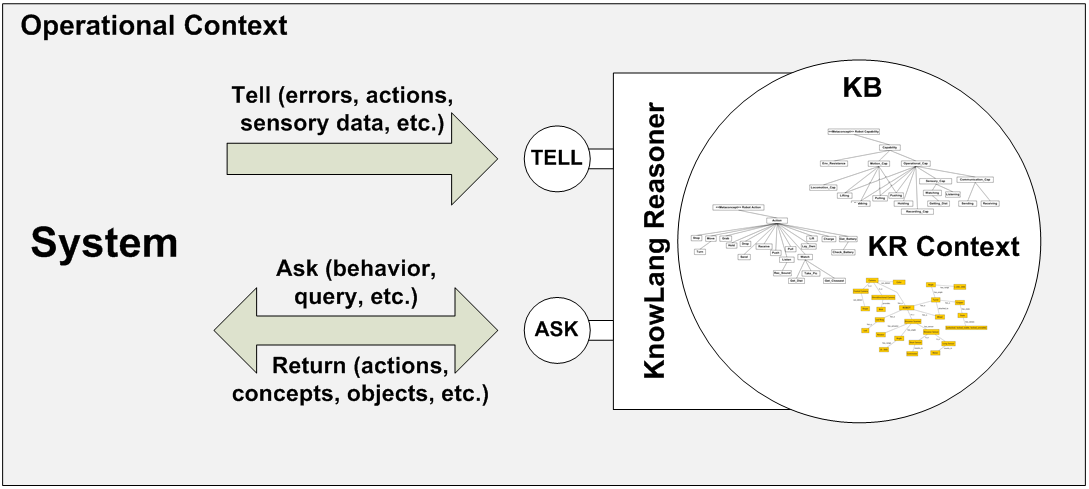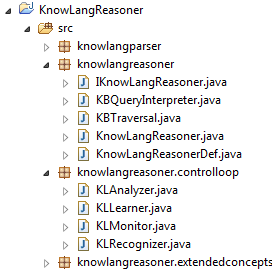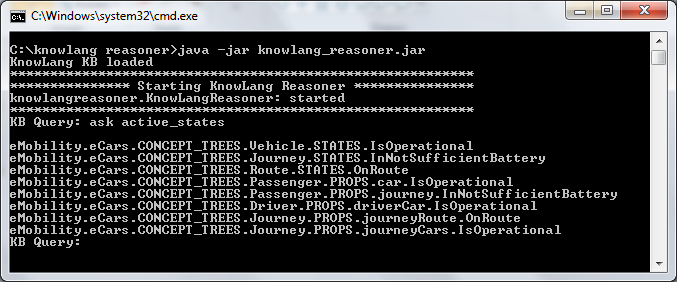|
|
|
|
|
The KnowLang Reasoner is supplied as a component hosted by a self-adaptive system and thus, it runs in the system's
Operational Context as any other system's component. However, it operates in the KR (knowledge representation) Context
and on the KB (represented knowledge). The system talks to the reasoner via special ASK and TELL Operators
allowing for knowledge queries and knowledge updates
Upon demand, the KnowLang Reasoner can also build up and return a self-adaptive behavior model - a chain of actions to be
realized in the environment or in the system.

Upon start, the KnowLang Reasoner creates and controls a special awareness control loop, which is implemented to help
the reasoner monitor, recognize, analyze, and learn. For example, when analyzing, the reasoner evaluates all the states specified
in the KB as following:
Enumeration eStates = KnowLangReasonerDef.vsStates.elements();
while (eStates.hasMoreElements())
{
eStates.nextElement().evaluateState();
}
In that way, the reasoner constantly evaluates all the states and deducts new state changes, thus emerging as
awareness about new situations, and realization of goals (recall that states are
used to express situations and goals).
|
|
|
|
Similarly to the KnowLang Toolset, the KnowLang Reasoner has been implemented in Java. Its Java implementation
is organized in four Java packages (see the figure below) that host all the necessary classes needed at both startup and runtime.
To embed the reasoner in an application, you need to integrate its Java packages to the applicationís Java implementation.

|
|
|
|
To operate, the KnowLang Reasoner requires a KnowLang-compiled KB. The file carrying the compiled KB should have the name
"compiledKB.bin" and should be placed in the host applicationís root directory. At startup, the reasoner loads this file and
builds the structures of the KB optimized for reasoning.
As shown in the following figure, there are a few important operations performed by the reasoner at startup. Along with loading the
compiled KB into a tree of optimized KnowLang tokens, these operations also build special information-retrieval and information-update
structures and load the implementation of multiple search algorithms. Finally, the startup process loads the awareness control loop and
a special query interpreter, and starts the control loop.

|
|
|
|
Once the KB is loaded, the reasoner waits for further instructions. When in a "waiting" mode, the reasoner is iterating over the awareness control loop.
Therefore, all the states expressed in KnowLang are constantly evaluated at any loop iteration (performed by the analyzer), which leads to
re-evaluation of all the goals and situations expressed with states. Via the ASK and TELL operators, the reasoner communicates with
the host system (the application embedding the KnowLang Reasoner). For example, the application may ask for "current_situation",
"active_states", "active_policy", "behavior", etc. Or, it may tell the reasoner about "prop_val"
(the value held by a conceptís property), "func_val" (the value returned by a conceptís function), "sensor_val" (the value carried
by a particular systemís sensor), "behavior_val" (the positive\negative feedback of a certain behavior), etc. The following is an example
of "ask active_states" command.

|
|
|
|